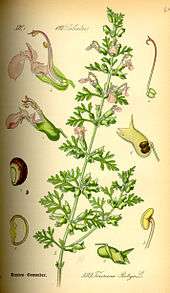Teucrium botrys
| Teucrium botrys | |
|---|---|
| | |
| Scientific classification | |
| Kingdom: | Plantae |
| (unranked): | Angiosperms |
| (unranked): | Eudicots |
| (unranked): | Asterids |
| Order: | Lamiales |
| Family: | Lamiaceae |
| Genus: | Teucrium |
| Species: | T. botrys |
| Binomial name | |
| Teucrium botrys L. | |
Teucrium botrys, the cutleaf germander[1] or cut-leaved germander is a low to short downy annual, sometimes biennial, plant. It was noted by Carl Linnaeus in 1753 and is classified as part of the genus Teucrium in the family Labiatae (Lamiaceae). It has oval, but deeply cut leaves, which appear almost pinnate in form. Its flowers are two-lipped but with the upper lip diminutive. They are pink to purple and form from the stem at the base of the leaves, in whorls. It is in flower in the northern hemisphere from June to October. It prefers limy soils and bare stony ground. It is native to Western Europe, especially France and Germany.[2] It has been introduced into north-eastern North America.

Teucrium botrys
References
- ↑ "Teucrium botrys". Natural Resources Conservation Service PLANTS Database. USDA. Retrieved 9 December 2015.
- ↑ Fitter, Richard; Fitter, Alastair; Blamey, Marjorie (1974). The Wild Flowers of Britain and Northern Europe. London: Collins. p. 196. ISBN 0-00-219715-4.
External links
- "Teucrium botrys L.". Encyclopedia of Life, available from "http://www.eol.org/pages/579680". Accessed 14 May 2011.
- Teucrium botrys L. Sp. Pl. ed. 1 562 (1753) Flora Italiana. Accessed May 2011
- Cutleaf Germander Biopix photo images. Accessed May 2011
- Teucrium botrys Linnaeus The Linnaean Plant Name Typification Project, Natural History Museum, London, Accessed May 2011
 Data related to Teucrium botrys at Wikispecies
Data related to Teucrium botrys at Wikispecies
This article is issued from Wikipedia - version of the 6/12/2016. The text is available under the Creative Commons Attribution/Share Alike but additional terms may apply for the media files.